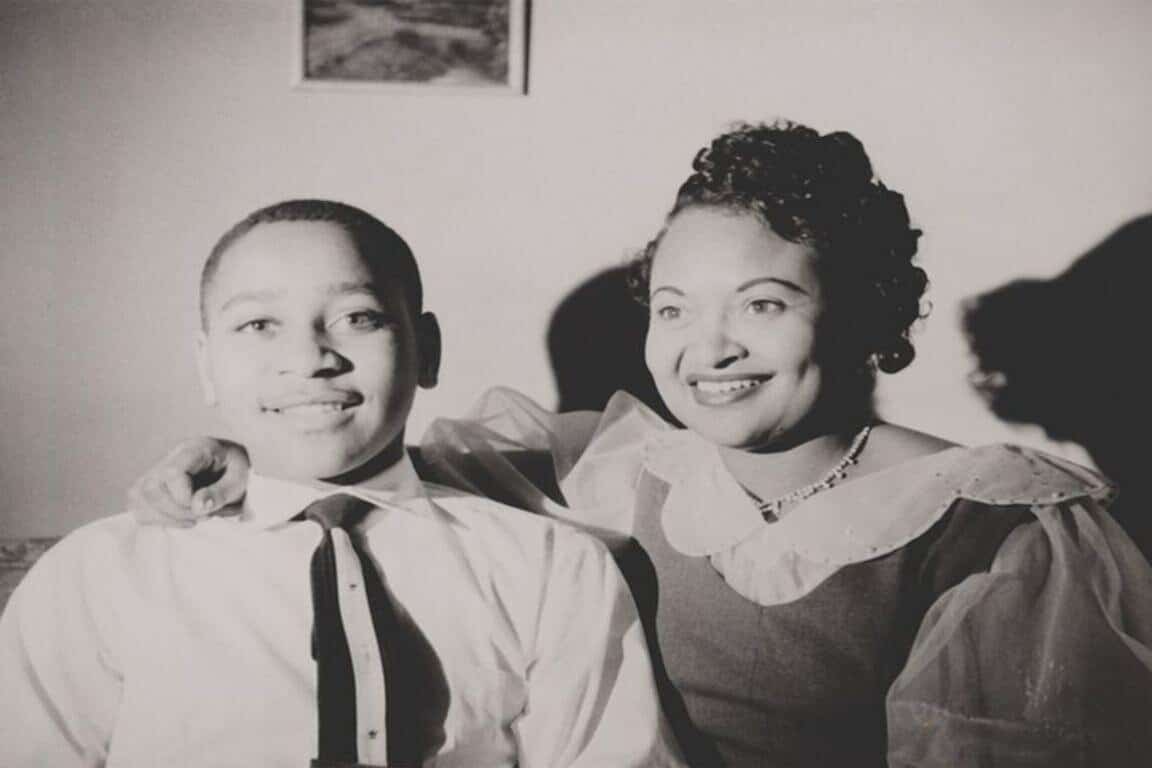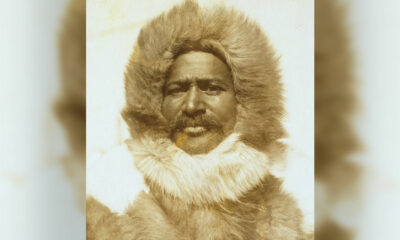Mississippi Today
National monument will honor Emmett Till and his mother in Mississippi and Chicago

President Joe Biden is expected to sign documents Tuesday to create a national monument honoring Emmett Till and his mother, according to National Park Service officials.
“The Till story is a vital part of the American story, and it’s fitting that it’s recognized and protected by the federal government,” said Dave Tell, author of “Remembering Emmett Till.”
After he was killed in Mississippi, his mother, Mamie Till-Mobley, insisted on opening his casket so “the world could see what they did to my boy.” Photographs of his brutalized body ran in Jet magazine and around the world, provoking international outrage.
In September 1955, an all-white jury acquitted half-brothers Roy Bryant and J.W. Milam — only for them to confess months later to Look magazine that they had killed the 14-year-old from Chicago.
Less than 10 weeks after the acquittal, Rosa Parks boarded a bus in Montgomery, Alabama, and refused to give up her seat. She was quoted later as saying she was thinking about Till the whole time.
To this day, he remains a flashpoint for civil rights activities. The Rev. Martin Luther King Jr. mentioned his name in the same breath with the 1963 assassination of his friend, Mississippi NAACP leader Medgar Evers.
In the decades since, Till’s name and photographs have appeared in protests alongside those of Trayvon Martin, Ahmaud Arbery and George Floyd.
Among the sites making up the Emmett Till and Mamie Till-Mobley National Monument:
- Roberts Temple Church of God in Christ in Chicago where Till’s funeral was held.
- Graball Landing, near where Till’s body was found in the Tallahatchie River.
- The Tallahatchie County Courthouse in Sumner, where the jury acquitted his killers.
Noticeably missing from the list is the former Bryant Grocery, where Till reportedly wolf-whistled at a white woman.
The store’s owners — the children of the late Ray Tribble, who voted with other jurors to acquit Till’s killers — have repeatedly refused to sell the store, demanding $4 million for the crumbling structure. That price tag prompted the late Alvin Sykes, the force behind the Emmett Till Unsolved Civil Rights Crimes Act, to remark that the family was “holding history hostage.”
The Rev. Wheeler Parker Jr., the last living witness of Emmett Till’s kidnapping, said it’s been his life’s work “to tell the truth of what happened to Emmett.”
“This national monument designation makes certain that Emmett Till’s life and legacy, along with his mother Mamie Till-Mobley’s social action and impact, will live on and be used to inspire others to create a more just and equitable society,” Parker said. “We thank President Biden for codifying the national monument and are heartened to know these places will foster empathy, understanding and healing for years to come.”
Veteran state Rep. Tommy Reynolds, D-Water Valley, says the action of President Joe Biden to designate the national monument to honor Emmett Till is the culmination of hard work by local people.
“We had people in Tallahatchie County work together to form the Emmett Till Commission. It was half white and half Black. A lot of people worked to preserve the sites and deserve credit. They worked together,” said Reynolds, who represents much of the area in the Mississippi House and is the attorney for the Tallahatchie County Board of Supervisors. He will be present at the Tuesday ceremonies at the White House and at the Department of Interior.
“This is going to be well received in our area. And it is appropriate to be remembered in hopes it will not happen again. We are all Americans and should have the right to life, liberty and happiness.”
Reynolds said the federal, state and local governments contributed to restoring the Tallahatchie County Courthouse in Sumner to its 1955 condition. In 1955 two white men were tried and acquitted by an all white jury for the murder of the teen-ager Till. The men later confessed to the murder.
The Mississippi Legislature passed a bill to allow Tallahatchie County to convey the deed to the courthouse to the federal government.
Money also has been raised to provide a new location to replace the historic Tallahatchie County Courthouse where routine business can be conducted. Under the agreement, the historic courthouse can still be used by the county until the new location is ready.
The center’s executive director, Patrick Weems, said the designation represents 15 years of hard work for a story that is pivotal in our nation’s history.
“The lynching of Emmett Till and the courage of Mamie Till Mobley served as a springboard to the modern Civil Rights Movement, and preserving this history in perpetuity will serve as a continual act of restorative justice,” Weems said. “We extend our deepest gratitude to the Tallahatchie County Board of Supervisors, and Congressman Bennie Thompson for championing this vision of reconciliation, which has now become a national monument.”
Rev. Willie Williams, chair of the board of directors of the Emmett Till Interpretive Center, praised the decision to designate a national monument.
“Out of the tragedy of Emmett Till’s brutal murder, a national monument has risen as a symbol of hope, healing, and reconciliation,” he said. “Through this designation, we affirm that what man intended for evil, God can indeed use for good. We honor the memory of Emmett Till and his mother, Mamie Till-Mobley, whose courageous actions sparked a civil rights movement and continue to inspire us today. We are grateful to the local people of Tallahatchie County who have tirelessly worked to make this monument a reality. Their efforts remind us that out of the ashes of tragedy, beauty can emerge, and that through collective action, we can transform pain into progress.”
The National Trust for Historic Preservation’s African American Cultural Heritage Action Fund and the Mellon Foundation are investing $5 million to help preserve the Roberts Temple Church of God in Christ for future generations.
Theresa Pierno, president and CEO of National Parks Conservation Association, said throughout our nation’s history, “There are few stories as heart wrenching as the murder of Emmett Till. It is a story that lays bare the brutality of systemic racism and injustice for the world to see.
“But it is also a story of determination,” Pierno said. “This is a story of a brave young mother who experienced a parent’s worst nightmare, but found the strength and power to rise up and shine a light on injustice as a leader in the Civil Rights Movement. Mamie Till-Mobley galvanized a movement and inspired a nation.
“Yet despite the progress we have made since 1955, the work is not done. The America we live in still bears many of the scars of the past, and some of our darkest history repeats itself. We still see echoes of Emmett’s story and blatant racial injustice in our society today, and as national park advocates, we are committed to doing our part to fight it. Black Lives Matter. They matter in our homes, they matter in our stores, our cities, and yes, in our national parks.”
Mississippi Today political reporter Bobby Harrison contributed to this report.
This article first appeared on Mississippi Today and is republished here under a Creative Commons license.
Mississippi Today
On this day in 1909, Matthew Henson reached the North Pole
April 6, 1909

Matthew Henson reached the North Pole, planting the American flag. Traveling with the Admiral Peary Expedition, Henson reportedly reached the North Pole almost 45 minutes before Peary and the rest of the men.
“As I stood there on top of the world and I thought of the hundreds of men who had lost their lives in the effort to reach it, I felt profoundly grateful that I had the honor of representing my race,” he said.
While some would later dispute whether the expedition had actually reached the North Pole, Henson’s journey seems no less amazing.
Born in Maryland to sharecropping parents who survived attacks by the KKK, he grew up working, becoming a cabin boy and sailing around the world.
After returning, he became a salesman at a clothing store in Washington, D.C., where he waited on a customer named Robert Peary. Pearywas so impressed with Henson and his tales of the sea that he hired him as his personal valet.
Henson joined Peary on a trip to Nicaragua. Impressed with Henson’s seamanship, Peary made Henson his “first man” on the expeditions that followed to the Arctic. When the expedition returned, Peary drew praise from the world while Henson’s contributions were ignored.
Over time, his work came to be recognized. In 1937, he became the first African-American life member of The Explorers Club. Seven years later, he received the Peary Polar Expedition Medal and was received at the White House by President Truman and later President Eisenhower.
“There can be no vision to the (person) the horizon of whose vision is limited by the bounds of self,” he said. “But the great things of the world, the great accomplishments of the world, have been achieved by (people with) … high ideals and … great visions. The path is not easy, the climb is rugged and hard, but the glory at the end is worthwhile.”
Henson died in 1955, and his body was re-interred with full military honors at Arlington National Cemetery. The U.S. Postal Service featured him on a stamp, and the U.S. Navy named a Pathfinder class ship after him. In 2000, the National Geographic Society awarded him the Hubbard Medal.
This article first appeared on Mississippi Today and is republished here under a Creative Commons Attribution-NoDerivatives 4.0 International License.![]()
Mississippi Today
A win for press freedom: Judge dismisses Gov. Phil Bryant’s lawsuit against Mississippi Today
Madison County Circuit Court Judge Bradley Mills dismissed former Gov. Phil Bryant’s defamation lawsuit against Mississippi Today on Friday, ending a nearly two-year case that became a beacon in the fight for American press freedom.
For the past 22 months, we’ve vigorously defended our Pulitzer Prize-winning reporting and our characterizations of Bryant’s role in the Mississippi welfare scandal. We are grateful today that the court, after careful deliberation, dismissed the case.
The reporting speaks for itself. The truth speaks for itself.
This judgment is so much more than vindication for Mississippi Today — it’s a monumental victory for every single Mississippian. Journalism is a public good that all of us deserve and need. Too seldom does our state’s power structure offer taxpayers true government accountability, and Mississippians routinely learn about the actions of their public officials only because of journalism like ours. This reality is precisely why we launched our newsroom nine years ago, and it’s why we devoted so much energy and spent hundreds of thousands of dollars defending ourselves against this lawsuit. It was an existential threat to our organization that took time and resources away from our primary responsibilities — which is often the goal of these kinds of legal actions. But our fight was never just about us; it was about preserving the public’s sacred, constitutional right to critical information that journalists provide, just as our nation’s Founding Fathers intended.
Mississippi Today remains as committed as ever to deep investigative journalism and working to provide government accountability. We will never be afraid to reveal the actions of powerful leaders, even in the face of intimidation or the threat of litigation. And we will always stand up for Mississippians who deserve to know the truth, and our journalists will continue working to catalyze justice for people in this state who are otherwise cheated, overlooked, or ignored.
We appreciate your support, and we are honored to serve you with the high quality, public service journalism you’ve come to expect from Mississippi Today.
READ MORE: Judge Bradley Mills’ order dismissing the case
READ MORE: Mississippi Today’s brief in support of motion to dismiss
This article first appeared on Mississippi Today and is republished here under a Creative Commons Attribution-NoDerivatives 4.0 International License.
Mississippi Today
Meet Willye B. White: A Mississippian we should all celebrate
In an interview years and years ago, the late Willye B. White told me in her warm, soothing Delta voice, “A dream without a plan is just a wish. As a young girl, I had a plan.”
She most definitely did have a plan. And she executed said plan, as we shall see.
And I know what many readers are thinking: “Who the heck was Willye B. White?” That, or: “Willye B. White, where have I heard that name before?”
Well, you might have driven an eight-mile, flat-as-a-pancake stretch of U.S. 49E, between Sidon and Greenwood, and seen the marker that says: “Willye B. White Memorial Highway.” Or you might have visited the Olympic Room at the Mississippi Sports Hall of Fame and seen where White was a five-time participant and two-time medalist in the Summer Olympics as a jumper and a sprinter.
If you don’t know who Willye B. White was, you should. Every Mississippian should. So pour yourself a cup of coffee or a glass of iced tea, follow along and prepare to be inspired.
Willye B. White was born on the last day of 1939 in Money, near Greenwood, and was raised by grandparents. As a child, she picked cotton to help feed her family. When she wasn’t picking cotton, she was running, really fast, and jumping, really high and really long distances.
She began competing in high school track and field meets at the age of 10. At age 11, she scored enough points in a high school meet to win the competition all by herself. At age 16, in 1956, she competed in the Summer Olympics at Melbourne, Australia.
Her plan then was simple. The Olympics, on the other side of the world, would take place in November. “I didn’t know much about the Olympics, but I knew that if I made the team and I went to the Olympics, I wouldn’t have to pick cotton that year. I was all for that.”
Just imagine. You are 16 years old, a high school sophomore, a poor Black girl. You are from Money, Mississippi, and you walk into the stadium at the Melbourne Cricket Grounds to compete before a crowd of more than 100,000 strangers nearly 10,000 miles from your home.
She competed in the long jump. She won the silver medal to become the first-ever American to win a medal in that event. And then she came home to segregated Mississippi, to little or no fanfare. This was the year after Emmett Till, a year younger than White, was brutally murdered just a short distance from where she lived.
“I used to sit in those cotton fields and watch the trains go by,” she once told an interviewer. “I knew they were going to some place different, some place into the hills and out of those cotton fields.”
Her grandfather had fought in France in World War I. “He told me about all the places he saw,” White said. “I always wanted to travel and see the places he talked about.”
Travel, she did. In the late 1950s there were two colleges that offered scholarships to young, Black female track and field athletes. One was Tuskegee in Alabama, the other was Tennessee State in Nashville. White chose Tennessee State, she said, “because it was the farthest away from those cotton fields.”
She was getting started on a track and field career that would take her, by her own count, to 150 different countries across the globe. She was the best female long jumper in the U.S. for two decades. She competed in Olympics in Melbourne, Rome, Tokyo, Mexico City and Munich. She would compete on more than 30 U.S. teams in international events. In 1999, Sports Illustrated named her one of the top 100 female athletes of the 20th century.
Chicago became White’s home for most of adulthood. This was long before Olympic athletes were rich, making millions in endorsements and appearance fees. She needed a job, so she became a nurse. Later on, she became an public health administrator as well as a coach. She created the Willye B. White Foundation to help needy children with health and after school care.
In 1982, at age 42, she returned to Mississippi to be inducted into the Mississippi Sports Hall of Fame and was welcomed back to a reception at the Governor’s Mansion by Gov. William Winter, who introduced her during induction ceremonies. Twenty-six years after she won the silver medal at Melbourne, she called being hosted and celebrated by the governor of her home state “the zenith of her career.”
Willye B. White died of pancreatic cancer in a Chicago hospital in 2007. While working on an obituary/column about her, I talked to the late, great Ralph Boston, the three-time Olympic long jump medalist from Laurel. They were Tennessee State and U.S. Olympic teammates. They shared a healthy respect from one another, and Boston clearly enjoyed talking about White.
At one point, Ralph asked me, “Did you know Willye B. had an even more famous high school classmate.”
No, I said, I did not.
“Ever heard of Morgan Freeman?” Ralph said, laughing.
Of course.
“I was with Morgan one time and I asked him if he ever ran track,” Ralph said, already chuckling about what would come next.
“Morgan said he did not run track in high school because he knew if he ran, he’d have to run against Willye B. White, and Morgan said he didn’t want to lose to a girl.”
This article first appeared on Mississippi Today and is republished here under a Creative Commons Attribution-NoDerivatives 4.0 International License.![]()
-

 Mississippi Today5 days ago
Mississippi Today5 days agoPharmacy benefit manager reform likely dead
-

 News from the South - Kentucky News Feed6 days ago
News from the South - Kentucky News Feed6 days agoTornado practically rips Bullitt County barn in half with man, several animals inside
-

 News from the South - Alabama News Feed5 days ago
News from the South - Alabama News Feed5 days ago'I think everybody's concerned': Mercedes-Benz plant eyeing impact of imported vehicle tariffs
-

 News from the South - Missouri News Feed7 days ago
News from the South - Missouri News Feed7 days agoThunderstorms drench areas south of St. Louis
-

 News from the South - Florida News Feed5 days ago
News from the South - Florida News Feed5 days agoFlorida special election results: GOP keeps 2 U.S. House seats in Florida
-

 News from the South - Alabama News Feed6 days ago
News from the South - Alabama News Feed6 days ago41st annual Bloomin Festival Arts and Crafts Fair (April 5 & 6) | March 31, 2025 | News 19 at 9 a.m.
-

 News from the South - South Carolina News Feed3 days ago
News from the South - South Carolina News Feed3 days agoSouth Carolina clinic loses funding due to federal changes to DEI mandates
-

 News from the South - Louisiana News Feed5 days ago
News from the South - Louisiana News Feed5 days agoMother turns son's tragedy into mental health mission















































